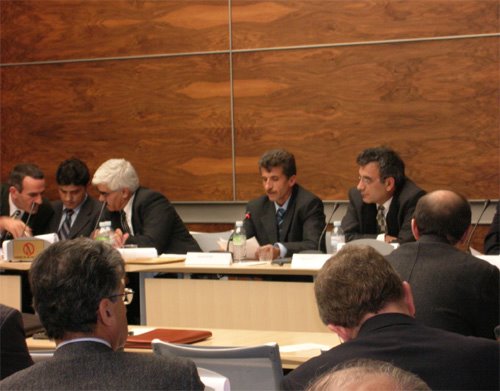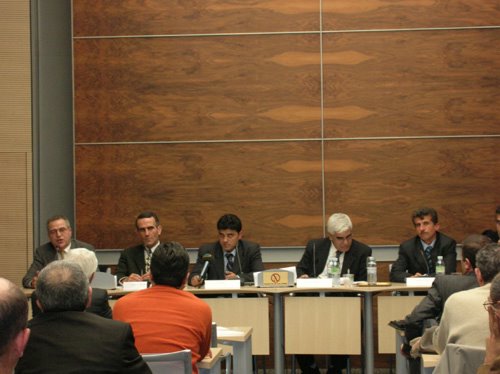Thirsday 1er December in the French Parliament, an International Conference was organized about “Kurdish Question in Syria”. Until nowadays, a lot of conferences had been organized concerning the Kurdish Question in the Middle-East. But these conferences were essentially focused on the 2 biggest pieces of the Kurdish Question : Kurds in Turkey and in Iraq. As far as I know, it was the first time that a such debate was only devoted to these 2 millions Kurds living in Syria, which, in spite of their few number (if we compare them with their compatriots from neighboured states), are concerned by two specific political issues : The general fate of Kurds in the Middle-East, and the situation and problems of which face only Kurds in Syria.
Being not numerous, with their fragmented geographical settlement in Syria, Western Kurds had never claimed separatist revendications. They had though supported and were engaged in Kurdihs cause, since the beginning of Kurdish national movements : Thus the members of Xoybûn, fighting in 1920s for their independance in Turkey, had their political basis in Syria (under the French Mandate), where they found an asylum, and where they could publish.
Richer, better educated, saved by the devastations of war, these Kurds thus provided, during all the 20th century, a financial and political support for the other Kurds, (from the KDP/PUK of Barzani and Talabani to the PKK, whose leader hardly left Damas in 20 years).
But there is also a Kurdish question in Syria, and in March 2004, it burst a little more noisy than usually, bringing it to the eyes of public opinion, when baathist militias tackled the Kurdish supporters during a match of foot, while launching slogans of support for Saddam Hussein. There were shots (while Kurds were disarmed) and a response. The Kurdish reaction undoubtedly surprised Syrian authorities by its strength and its width: in a few days, all the Kurdish cities revolted. Hafez el Asad’s portraits were even torn or broken.
The conference treated of the particular situation of Kurds in Syria, with firstly a historical survey of the past of this community, which had been “integrated” in Syria, after the “cutting” of Othoman vilayets : Western Kurds were arbitrarily separated from the other Kurds, incorporated in Turkey or Iraq (families were thus separated, or villages shared in two parts). A representative of Amnesty International, Francoise Morzière, evoked the situation of the humans right in Syria. This country is one of the most repressive dictatorships for all its Kurdish or Arab citizens, or of various origins.

The prospects and the future of these Kurds were reviewed, by different speakers of Kurdish parties of Syria, such as Al-Jabha, Yekitî, the Democratic Union or Azadî. It is necessary here to mention the characteristic of the political scene of Western Kurds, which is characterized by a rather consequent plurality among political parties, giving to the debate a more open minded, more democratic aspect, and at the same time, complicates the task for claiming with a single voice. They have thus reached up to 18 political parties, for 2 million people!
If we compare with Northern Kurds, which could hardly express themselves out of/against the PKK, or with Southern Kurds and their both big tribal parties, Western Kurds are the “Graeculi in Kurdistan” (quite Athenians), for the political debate is more pluralist and real. On the other hand, this crumbling of movements weakens them. A time, the PKK sought to be dominant with its usual manner (“authoritative”, let us say) but some acts of violence and the assassination of Kurdish personalities in Syria rose a great indignation among the population and other parties, which are not ready not ready to accept a repressive monolithism. The collusion between Syria and the PKK is also a serious handicap, especially since 1999.

One of the most interesting and lively “tables rondes” was animated by lawyers, jurists, writers and politicians, which came directly from Syria, who dissected with many precise details the nature of Syrian State, the nature of Baathism regime, which, in its own ideology, contains the negation and the exclusion of non-Arabic groups in Syria. They exposed their presentation with concrete examples, for these representatives are working on the ground. The laws of exception, the police State, were thus screened by Rifaat Semo, Lazgîn Ibou, while Marwan Othman told in a poetic and rich, almost epic Kurdish, the rising of March 2004, the Serhildan. The advantage of these conferences is to allow to different people to meet each other, more easily as in the country. The relations between the Arab and Kurdish oppositions were thus evoked. Until the beginning of 2000, there were few contacts between the two groups, and dialogue or an eventual coordination took a long time to start and remains still timid, firstly because of the difficulty for these groups of opposition to exert their democratic and political rights, but also because the taboos relating to the dichotomy “Arab nationalism/Kurdish separatism” are still strong. But finally, common platforms have been created, like the committee Kurds-Arabs Dialogue, represented here by Habib Ibrahim, or the presence at the same table of Borhan Ghalioun, the director of the Center of studies of the contemporary East and Abdulbasset Seida, a philosopher and Kurdish writer, who has just published a book on the Kurds of Syria.
If you like to read more :
Syria, the silenced Kurds, by Virginia N Sherry, Human Rights Watch/ Middle East Publication, 1996.

Very interesting… Thank you, Piling, for making a report on it… =D
Let’s hope France will take a more ACTIVE role in the Kurdish cause… It has been so passive that it has caused a lot of questioning in my mind “- Are the US and UK the ONLY “superpowers” in the West?” Russia too – should be more active… As they should all follow Germany’s lead – as the new Christian Democrat leader and Bundeskansler is doing… SUPPORT US DAMN IT! PEOPLE ARE DYING FOR IT! Those are the angry thoughts… 😛
You know France is not a Super power anymore… not without UE, as UK is nothing without US.
But UE policy with Syria is like alwaus, hypocrisy : they just want to make interesting trade with it. The only positive poiint is that Baathists in Syria are afraid of America.
The 2005 Reporters Without Borders – Fondation de France prize in the “cyberdissident” category was awarded on 7 December to a kurdish journlaist living in Syria, Massoud Hamid. He was arrested in July 2004 and sentenced to three years in prison for “membership of a secret organisation” after posting photos of a Kurdish demonstration in Syria on a foreign-based website.
It is a nice news, for Kurds in Syria are too often the “silenced Kurds”.